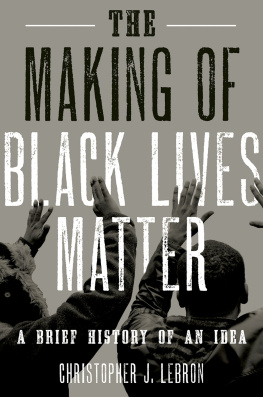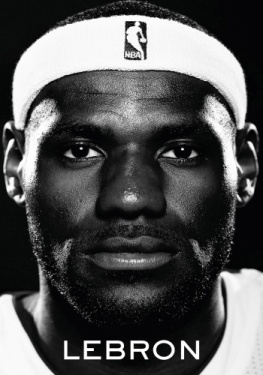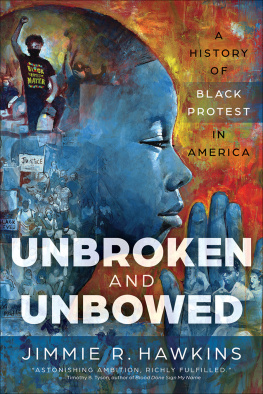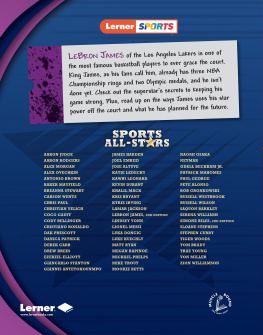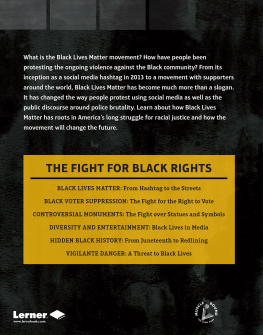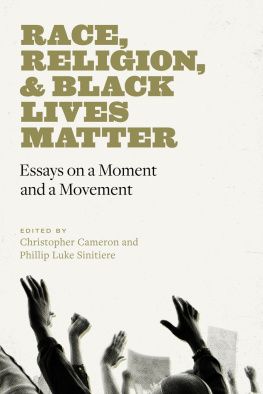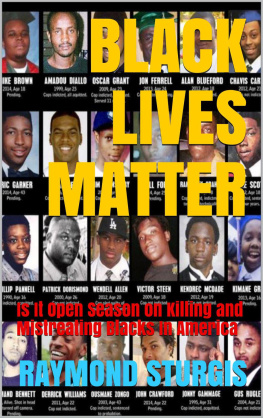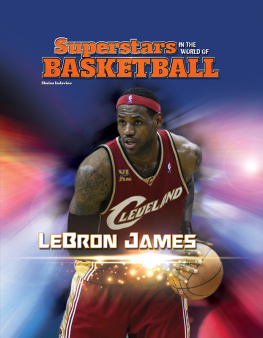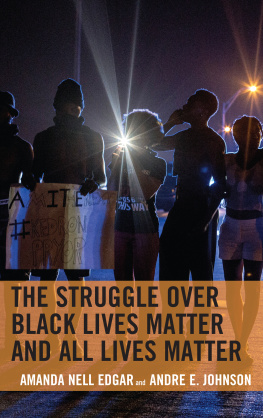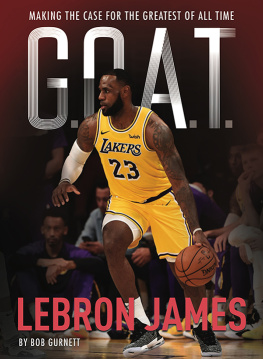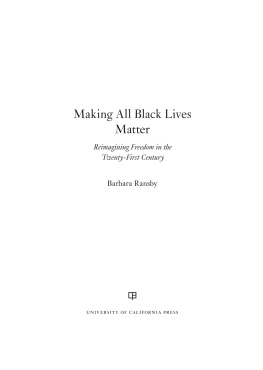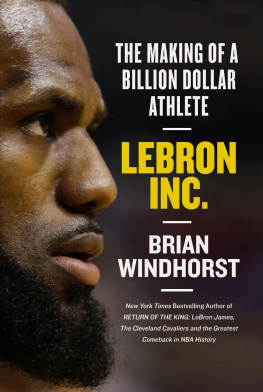Christopher J. Lebron - The Making of Black Lives Matter: A Brief History of an Idea
Here you can read online Christopher J. Lebron - The Making of Black Lives Matter: A Brief History of an Idea full text of the book (entire story) in english for free. Download pdf and epub, get meaning, cover and reviews about this ebook. year: 2017, publisher: Oxford University Press, genre: Politics. Description of the work, (preface) as well as reviews are available. Best literature library LitArk.com created for fans of good reading and offers a wide selection of genres:
Romance novel
Science fiction
Adventure
Detective
Science
History
Home and family
Prose
Art
Politics
Computer
Non-fiction
Religion
Business
Children
Humor
Choose a favorite category and find really read worthwhile books. Enjoy immersion in the world of imagination, feel the emotions of the characters or learn something new for yourself, make an fascinating discovery.
- Book:The Making of Black Lives Matter: A Brief History of an Idea
- Author:
- Publisher:Oxford University Press
- Genre:
- Year:2017
- Rating:5 / 5
- Favourites:Add to favourites
- Your mark:
- 100
- 1
- 2
- 3
- 4
- 5
The Making of Black Lives Matter: A Brief History of an Idea: summary, description and annotation
We offer to read an annotation, description, summary or preface (depends on what the author of the book "The Making of Black Lives Matter: A Brief History of an Idea" wrote himself). If you haven't found the necessary information about the book — write in the comments, we will try to find it.
The Making of Black Lives Matter: A Brief History of an Idea — read online for free the complete book (whole text) full work
Below is the text of the book, divided by pages. System saving the place of the last page read, allows you to conveniently read the book "The Making of Black Lives Matter: A Brief History of an Idea" online for free, without having to search again every time where you left off. Put a bookmark, and you can go to the page where you finished reading at any time.
Font size:
Interval:
Bookmark:


Oxford University Press is a department of the University of Oxford. It furthers the Universitys objective of excellence in research, scholarship, and education by publishing worldwide. Oxford is a registered trade mark of Oxford University Press in the UK and certain other countries.
Published in the United States of America by Oxford University Press 198 Madison Avenue, New York, NY 10016, United States of America.
Oxford University Press 2017
All rights reserved. No part of this publication may be reproduced, stored in a retrieval system, or transmitted, in any form or by any means, without the prior permission in writing of Oxford University Press, or as expressly permitted by law, by license, or under terms agreed with the appropriate reproduction rights organization. Inquiries concerning reproduction outside the scope of the above should be sent to the Rights Department, Oxford University Press, at the address above.
You must not circulate this work in any other form and you must impose this same condition on any acquirer.
Library of Congress Cataloging-in-Publication Data
Names: Lebron, Christopher J., author.
Title: The making of Black lives matter : a brief history of an idea /
Christopher J. Lebron.
Description: New York, NY : Oxford University Press, 2017. |
Includes bibliographical references and index.
Identifiers: LCCN 2016042413 | ISBN 9780190601348 (hardcover : alk. paper) | eISBN 9780190601362
Subjects: LCSH: Black lives matter movement. | African AmericansSocial
conditions21st century. | African AmericansPolitics and
government21st century. | EqualityUnited States. | RacismUnited
States. | United StatesRace relations.
Classification: LCC E185.615 .L393 2017 | DDC 305.896/0730905dc23
LC record available at https://lccn.loc.gov/2016042413
Giovannis Room 1956 and The Fire Next Time 1962, 1963 by James Baldwin.
Copyright renewed. Published by Vintage Books. Used by arrangement with the
James Baldwin Estate.
Kids Who Die from The Collected Poems of Langston Hughes, by Langston
Hughes, edited by Arnold Rampersad with David Roessel, Associate Editor,
copyright 1994 by the Estate of Langston Hughes. Used by permission of Alfred
A. Knopf, an imprint of the Knopf Doubleday Publishing Group, a division of
Penguin Random House LLC. All rights reserved. Reprinted by permission of
Harold Ober Associates Incorporated. Copyright as given by Random House.
People cant, unhappily, invent their mooring posts, their lovers and their friends, anymore than they can invent their parents. Life gives these and also takes them away and the great difficulty is to say Yes to life.
JAMES BALDWIN, Giovannis Room
IT CAN BE DIFFICULT TO keep up. Ive published one previous book, numerous papers, essays, and book reviews in a wide range of outlets, both academic and public, and have another book manuscript well in the making. And every time, I begin at the beginningI always write an introduction first. The introduction is what has typically guided the vision and framework for whatever follows: op-ed, essay, book review, book. That has been my own conventional wisdom. When I began work on The Making of Black Lives Matter: A Brief History of an Idea, I knew I couldnt write that way. Though this is a book of intellectual history, its motivating moment is a dynamic one. I hoped beyond hope that in the year or so it took me to write it, the fatal conditions in America that moved me to write the book in the first place would allow me to qualify with a ray of optimism the somber reflections that follow. But I also knew that things might change very little, or possibly get worse. I intentionally saved the introduction as the last major piece of writing for this book. The result? Just one week prior to my sitting at my computer to write these words, Alton Sterling and Philando Castile were killed by Baton Rouge and Minneapolis police, respectively. We must add their names to the dead in the name of the living:
Oscar Grant, Shereese Francis, Rekia Boyd, Kendrec McDade, Tamon Robinson, Shantel Davis, Jonathan Ferrell, Jordan Baker, McKenzie Cochran, Eric Garner, John Crawford, Michael Brown, Tanisha Anderson, Ezell Ford, Kajieme Powell, Akai Gurley, Tamir Rice, Dontre Hamilton, Bettie Jones, Roy Nelson, Tiara Thomas, Alonzo Smith, Anthony Ashford, Tyree Crawford, Samuel Dubose, Sandra Bland, Walter Scott, Natasha McKenna, Alton Sterling, Philando Castile.
This list is far from complete. In fact, its short by hundreds of names that are the damning evidence of the level of violence against black bodies in America. What you might find shocking is that the hundreds of names missing do not span a century or even decades of American history. Rather, the list Ive provided begins in 2012. And it is missing the one name we might look back upon from some future vantage point as the most important in the history of todays racial struggle: Trayvon Martin.
The story of the movement that seeks to redeem a nation begins with Martin. The evening of February 26, 2012, Martin was walking through a Sanford, Florida community wearing a hoodie and holding only a soft drink and some candy. George Zimmerman, a neighborhood watch volunteer, deemed Martin suspicious and called the police though Thus, it was the death and failure of our justice system to account for the unnecessary death of a black American that prompted three women to offer these three basic and urgent words to the American people: black lives matter.
Today, #BlackLivesMatter has become a force demanding change in America. Eschewing traditional hierarchical leadership models, the movement cannot be identified with any single leader or small group of leaders, despite the role Cullors, Tometi, and Garza played in giving us the social movement hashtag that will likely define our generation. Rather, #BlackLivesMatter represents an ideal that motivates, mobilizes, and informs the actions and programs of many local branches of the movement. Much like the way a corporate franchise works, minus revenue and profit, #BlackLivesMatter is akin to a social movement brand that can be picked up and deployed by any interested group of activists inclined to speak out and act against racial injustice.
There is no doubt that the movement itself is historically momentous, even if it remains unclear as of this writing the level of policy efficacy #BlackLivesMatter has been able to bring to bear on the problem of racial justice. Indeed, it is precisely because of the nascent and formative status that I resisted writing directly on the movement. I did not, nor do not as of this writing perceive a space or opportunity to say something sufficiently systematic and helpful about the movement on which so many black Americans are pinning their hopes. Yet, there is something undeniably powerful about those three words: black lives matter. Yes, it is true that they were brought into our political existence at a moment marked by tragedy and unjustifiable losses of black life. That alone makes those three words a touchstone for our American lives todaythe struggle to insist that black lives are indeed lives and therefore not candidates for cursory or careless or hateful or negligible elimination. The problem as I saw it from the perspectives of a citizen, a black Latino man, and a scholar was to honor the moment in which we find ourselves, at the helm of which is a movement that seeks to finally undo this nations murderous racial history. This is a history that spans and reaches like a weed across centuries. Indeed, the only way, I think, to appropriately reflect on this moment that seeks once and for all to place black Americans on a level of human equality with whites is to treat the #BlackLivesMatter movement as intelligent, enduring, and politically savvy. As a trained political philosopher, I had no way of directly engaging the movement given its short life. The Black Power generation had in the sharp and brave tome penned by Kwame Ture and Charles Hamilton,
Font size:
Interval:
Bookmark:
Similar books «The Making of Black Lives Matter: A Brief History of an Idea»
Look at similar books to The Making of Black Lives Matter: A Brief History of an Idea. We have selected literature similar in name and meaning in the hope of providing readers with more options to find new, interesting, not yet read works.
Discussion, reviews of the book The Making of Black Lives Matter: A Brief History of an Idea and just readers' own opinions. Leave your comments, write what you think about the work, its meaning or the main characters. Specify what exactly you liked and what you didn't like, and why you think so.

